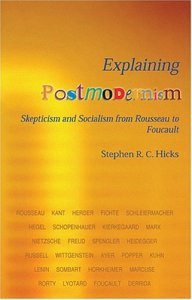Translating deep thinking into common sense
Book Review: Explaining Postmodernism, by Stephen Hicks

By Anoop Verma
June 11, 2016
SUBSCRIBE TO SAVVY STREET (It's Free)
What are the political, social, and cultural outcomes that the intellectuals want to achieve by embracing postmodernity? Stephen Hicks provides lucid answers to such questions about the postmodernist movement, which now dominates academia and exercises critical intellectual influence on political, social, and cultural issues.
The age in which we live, as understood by leading intellectuals, is not the modern, it is the postmodern. The age of modernity is the age of reason, and the postmodern intellectuals, being historically and philosophically opposed to modernity, speak about targeting the arrogance of reason. They want to attack the idea that we can comprehend reality only by applying reason.
What is the historical origin of the ideas which allow the intellectuals to attack reason, reject modernity and embrace postmodernity? What are the political, social, and cultural outcomes that the intellectuals want to achieve by embracing postmodernity? In Explaining Postmodernism: Skepticism and Socialism from Rousseau to Foucault, Stephen Hicks provides lucid answers to such questions about the postmodernist movement, which now dominates academia and exercises critical intellectual influence on political, social, and cultural issues.
Most post-Enlightenment era philosophers view the Enlightenment with suspicion, or at least a vague unease. Postmodernism represents the climax of the ideas of the counter-Enlightenment philosophers; it is another attempt to defeat the Enlightenment ideas by denying reason, values and reality. To fuel unrest and confusion in capitalist societies, the postmodernists propose a toolkit of grievances—minorities’ issues, feminism, racism, income equality, free education and healthcare, higher minimum wage, animal rights, environmentalism, and the like.
Hicks explains that there is a clear change of guard in the intellectual scene, and the “names of the postmodern vanguard are now familiar: Michel Foucault, Jacques Derrida, Jean-Francois Lyotard, and Richard Rorty.” He describes these intellectuals as the leading strategists, whose efforts have set the direction and tone of postmodernist movement.
Modernist philosophy, which has existed for several centuries, came to maturity in the Enlightenment. Hicks writes: “The Enlightenment philosophes quite rightly saw themselves as radical. The pre-modern Medieval worldview and the modern Enlightenment worldview were coherent, comprehensive—and entirely opposed—accounts of reality and the place of human beings within it.”
When postmodernism rejects modernism, it is essentially rejecting the Enlightenment ideas. Explaining the fundamental way in which postmodernism attacks the Enlightenment’s essential philosophical themes, Hicks says: “Postmodernism rejects the reason and the individualism that the entire Enlightenment world depends upon. And so it ends up attacking all of the consequences of the Enlightenment philosophy, from capitalism and liberal forms of government to science and technology.”
The postmodernists aim to re-shape the entire world in the same way as the Enlightenment project. For the achievement of such an ambition, individuals, across many generations, must be engaged for formulating the arguments and developing the intellectual strategies.
Hicks says that at the apex of the intellectual movement that has led to postmodernism there are figures like Georg Hegel, Arthur Schopenhauer, Immanuel Kant, and to a lesser extent David Hume. The ideas of these figures have been used by the likes of Martin Heidegger, Ludwig Wittgenstein, Friedrich Nietzsche, and Karl Marx. These figures, in turn, provide philosophical support to the likes of Rorty, Foucault, Leotard, and Derrida.
The early counter-Enlightenment philosophers were horrified by the Enlightenment’s championing of reason and individualism—they saw such ideas leading to a godless, spiritless, passionless, and amoral world.
The early counter-Enlightenment philosophers were horrified by the Enlightenment’s championing of reason and individualism—they saw such ideas leading to a godless, spiritless, passionless, and amoral world. Many of them got inspired by the collectivist philosophy of Jean-Jacques Rousseau. Hume’s attack on reason was a source of inspiration. Hicks is of the view that because of the weakness in the Enlightenment account of reason, the Counter-Enlightenment philosophers were able to win support for their ideas of skepticism, subjectivism, and relativism.
The epistemological battle between the Enlightenment ideas and the Counter-Enlightenment ideas has been going on for more than two centuries. Hicks calls Immanuel Kant “the most significant thinker of the Counter-Enlightenment” and regards him as the main culprit behind postmodernism’s strong anti-realist and anti-reason stances. Kant claimed that we could not know the world as it is in itself, and his postmodernists followers believe that there is no reality—rather, we create reality through our discourses and scientific methods.
Hegel also made significant contributions to the Counter-Enlightenment. He explicitly rejected Aristotle’s law of non-contradiction. The Hegelian theory of dialectical reason, which implies strong relativism, is fundamentally opposed to the Enlightenment idea of reason.
 Martin Heidegger absorbed the philosophy of Kant and Hegel and gave it a phenomenological twist. Heidegger proposed that by exploring his dark and anguished feelings of dread and guilt, he could approach Being. What Heidegger was aiming at was nihilism, as Hicks points out: “So after abandoning reason and logic, after experiencing real boredom and terrifying dread, we unveil the final mystery of mysteries: Nothing. In the end, all is nothing and nothing is all. With Heidegger, we reach metaphysical nihilism.”
Martin Heidegger absorbed the philosophy of Kant and Hegel and gave it a phenomenological twist. Heidegger proposed that by exploring his dark and anguished feelings of dread and guilt, he could approach Being. What Heidegger was aiming at was nihilism, as Hicks points out: “So after abandoning reason and logic, after experiencing real boredom and terrifying dread, we unveil the final mystery of mysteries: Nothing. In the end, all is nothing and nothing is all. With Heidegger, we reach metaphysical nihilism.”
After a roundup of almost 220 years of philosophy, Hicks presents his first hypothesis on the origin of postmodernism: “Postmodernism is the first ruthlessly consistent statement of the consequences of rejecting reason, those consequences being necessary given the history of epistemology since Kant.” He goes on to say that postmodernism is the “end result of the Counter-Enlightenment inaugurated by Kantian epistemology.”
Why are the postmodernists always Left leaning in their politics? In the chapter, “The Climate of Collectivism,” Hicks analyzes the connection between postmodern epistemology and postmodern politics. He points out: “Of the major names in the postmodernist movement, there is not a single figure who is not Left-wing in a serious way.” He posits that the postmodernism is an outcome of the same Counter-Enlightenment intellectual movement that gave rise to socialism and communism. Yesterday’s socialists are today’s postmodernists.
The socialists had to clamber aboard the postmodernist bandwagon, because, in theory, free-market thinkers have won the debate. All of socialism’s claims have been refuted. The capitalist nations are much more prosperous, productive, and peaceful than the socialist nations. In the context of the extreme leftist politics of the postmodernists, Hicks presents his second hypothesis on postmodernism: “Postmodernism is the academic Far Left’s epistemological strategy for responding to the crisis caused by the failures of socialism in theory and practice.”
The socialists had to clamber aboard the postmodernist bandwagon, because, in theory, free-market thinkers have won the debate. In the context of the extreme leftist politics of the postmodernists, Hicks presents his second hypothesis on postmodernism: “Postmodernism is the academic Far Left’s epistemological strategy for responding to the crisis caused by the failures of socialism in theory and practice.”
On the role that Rousseau has played in development of political ideas for the Counter-Enlightenment, Hicks says: “Rousseau’s writings were the Bible of the Jacobin leaders of the French Revolution, absorbed by many of the hopeful Russian revolutionaries of the late nineteenth century, and influential upon the more agrarian socialists of the twentieth century in China and Cambodia. In the theoretical world of academic socialism, Rousseau’s version of collectivism was eclipsed by Marx’s version for most of the nineteenth and much of the twentieth century. Yet a large part of the explanation of the postmodern thought is a shift toward Rousseauian themes by thinkers who were originally inspired by Marx but who are now increasingly disillusioned.”
During the 1950s, the radical Left was hoping that the Soviet Union would outstrip the capitalist West and serve as an exemplar of moral idealism and economic production, but the information from Soviet Union showed that their economy was in a disastrous shape and in the countryside people were starving to death.
It also became widely known that Stalin had millions of people tortured, subjected to inhuman deprivations and executed. Khrushchev exposed Stalin’s crimes in the “secret speech” that he made to the 20th Congress of the Communist Party of Soviet Union. On the other hand, the capitalist countries were having a booming economy and a massive rise in the standards of living for all. From the 1950s onwards, it became increasingly hard for leftist intellectuals to argue that capitalism fails to provide for people’s needs. They had to devise new ideas for remaining relevant.
During the 1960s, the hardline Left tried to gain political power through terrorism. But the liberal capitalist governments were able to subdue the terrorists, killing some, imprisoning many, and driving others underground more or less permanently. According to Hicks, the collapse of the terrorist wing of the hardline Left, during the 1970s, finally drove the leftist intellectuals and their followers into postmodernism. The academia became the new postmodern bastion for the Left.
Foucault, Lyotard, Derrida, and Rorty—the four intellectuals who came to prominence as the leaders of the postmodern movement were born in 1920s and 1930s, within a 7 year span. Describing their similar background, Hicks writes:
“All were well trained in philosophy at the best schools. All entered their academic careers in the 1950s. All were strongly committed to Left politics. All were well aware of the history of socialist theory and practice. All lived through the crises of socialism in the 1950s and 1960s. And come the end of the 1960s and early 1970s, all four had high standing in their professional academic disciplines and high standing among the intellectual Left.”
Explaining Postmodernism is an engaging book for those who wish to understand the modern Left, which is the postmodern Left.
Explaining Postmodernism: Skepticism and Socialism from Rousseau to Foucault (Scholargy Publishing, 2004; expanded edition, 2011) is an engaging book for those who wish to understand the modern Left, which is the postmodern Left. But this book also seeks to nourish the Enlightenment project, by explaining how the massive progress that mankind made during the last 250 years, is a result of the Enlightenment ideas. Even though the key ideas of the Enlightenment were philosophically incomplete and vulnerable, they have made such seminal improvements in human life. It is tempting to imagine the progress that the world will enjoy once the Enlightenment project is philosophically complete.
The book ends, as one would expect, with a suggestion for the way forward:
“The Enlightenment was based on premises opposite to those of postmodernism, but while the Enlightenment was able to create a magnificent world on the basis of those premises, it articulated and defended them only incompletely. That weakness is the sole source of postmodernism’s power against it. Completing the articulation and defense of those promises is therefore essential to maintaining the forward progress of the Enlightenment vision and shielding it against postmodern strategies.”








